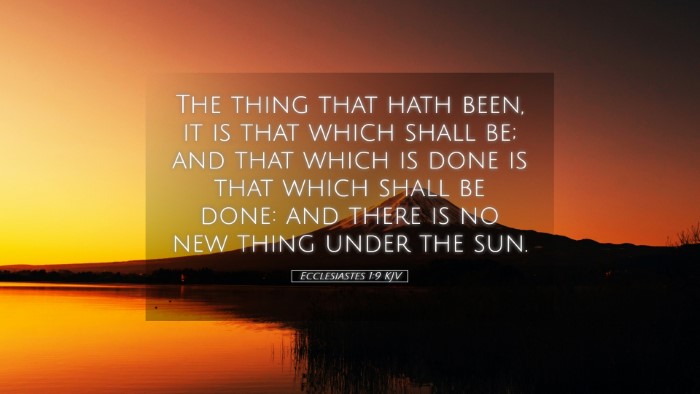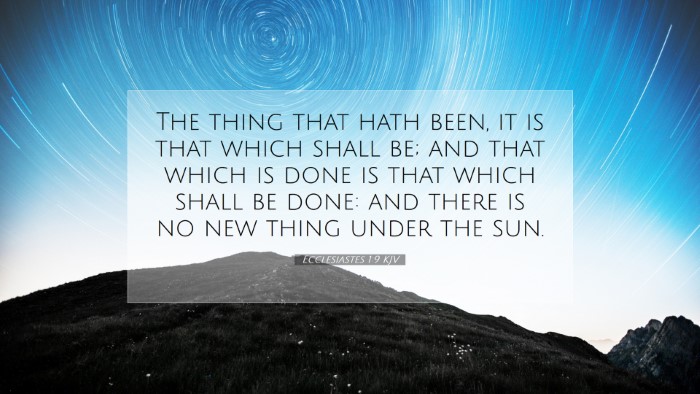Commentary on Ecclesiastes 1:9
Ecclesiastes 1:9 states, "What has been is what will be, and what has been done is what will be done, and there is nothing new under the sun." This verse encapsulates a profound realization about the nature of human experience and the cyclical patterns of life.
In this commentary, we will draw insights from various public domain sources including the works of Matthew Henry, Albert Barnes, and Adam Clarke to provide a comprehensive understanding of the themes and implications of this scripture.
Contextual Understanding
The book of Ecclesiastes is traditionally attributed to King Solomon, who reflects on the meaning of life and the futility that often accompanies human endeavors. This particular verse appears within a discourse on the vanity of worldly pursuits and the inevitable return of experiences throughout generations.
Analysis of the Verse
Matthew Henry's Commentary notably emphasizes that this statement reveals the repetitive nature of human existence. He posits that while mankind may strive for originality and innovation, the core aspects of life remain unchanged. Henry interprets this as a call to recognize the limitations of human effort in achieving everlasting significance.
He further suggests that this cyclical understanding points to a divine sovereignty where God orchestrates the ebb and flow of history. The "nothing new" phrase serves as a reminder to audiences, particularly in their daily toil, that their struggles and triumphs are part of an age-old narrative.
Albert Barnes provides a similar perspective, remarking on the historical patterns that repeat throughout time. Barnes asserts that human actions often recur in varying contexts but embody the same foundational issues: ambition, struggle, and the pursuit of meaning.
He articulates how this awareness can foster humility among believers, encouraging them to seek solace in the eternal truths that undergird their faith, rather than the fleeting pursuits of life.
Adam Clarke’s Exposition expands on this by delving into the implications of the phrase "under the sun." Clarke argues that the term implies a world-bound perspective, one that is limited to earthly observations devoid of spiritual insight. Thus, the statement serves to challenge readers to look beyond the physical realm to grasp the deeper, spiritual realities that transcend temporal existence.
Theological Implications
Reflecting on Ecclesiastes 1:9, we discover crucial theological themes that speak relevantly to pastors, students, theologians, and scholars. The verse prompts a deeper inquiry into God's providential governance over history and the repeated nature of human struggles, which beckons believers towards introspection.
-
The Nature of Time: This verse challenges conventional understandings of time as linear. Instead, it presents time as cyclical, where experiences may re-emerge, reiterating the insignificance of human novelty.
-
Human Limitations: The realization that "there is nothing new under the sun" elevates a sense of humility over pride. It awakens the recognition that all human innovation is often a rehashing of previous concepts or actions.
-
The Call to True Wisdom: It invites believers to pursue wisdom that goes beyond mere knowledge or experience. True wisdom, as framed in Ecclesiastes, is rooted in reverence for God—the source of lasting truth and understanding.
-
Futility Without God: The commentary collectively points out how pursuits without a divine center lead to futility. Human efforts, while seemingly innovative, fall short of purpose without alignment to God’s eternal design.
-
Encouragement in Trials: Finally, this verse can offer consolation. Understanding that struggles are shared throughout generations can uplift those feeling alone in their experiences, fostering community and shared faith.
Practical Applications
For pastors and church leaders, Ecclesiastes 1:9 serves as an essential teaching tool. It allows discussions on the nature of human experience and the importance of grounding one’s life and ministry in the unchanging truths of Scripture.
For students and scholars, the text beckons deeper research into the historical cycles of humanity, prompting examinations of how past experiences inform current realities. It encourages a consideration of how the lessons of the past repeat and what they reveal about God's character and plans.
Ultimately, this verse, when fully contemplated, imparts wisdom that calls for reflection on one’s life choices, encouraging a shift from pursuit of novelty to the pursuit of profound, eternal truths in Christ.
Conclusion
In conclusion, Ecclesiastes 1:9 encapsulates a manifold perspective on life that transcends mere observation. Engaging with the insights of historical commentators enriches our understanding and appreciation for the timeless nature of God’s truth. The verse invites us deeper into a relationship with the Creator, urging us to find meaning beyond the cyclical nature of existence.


